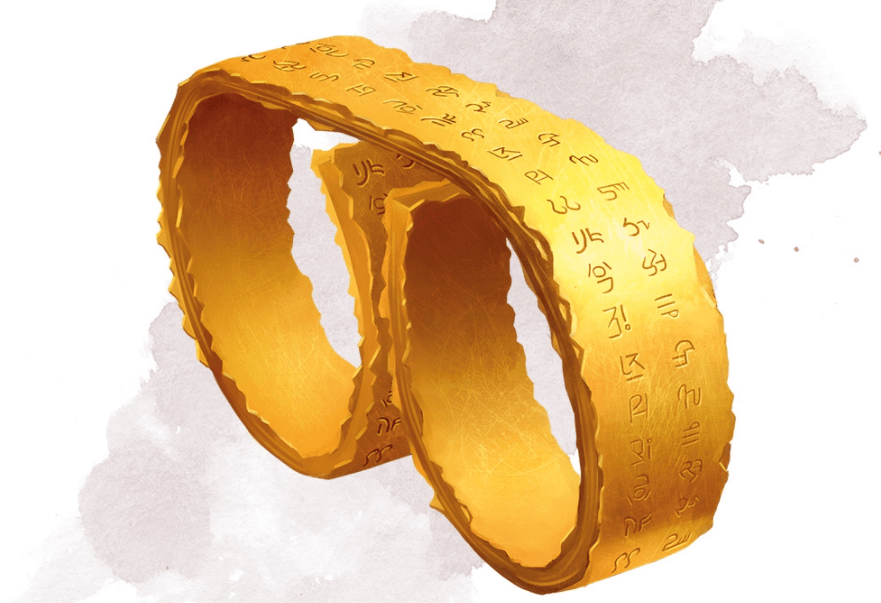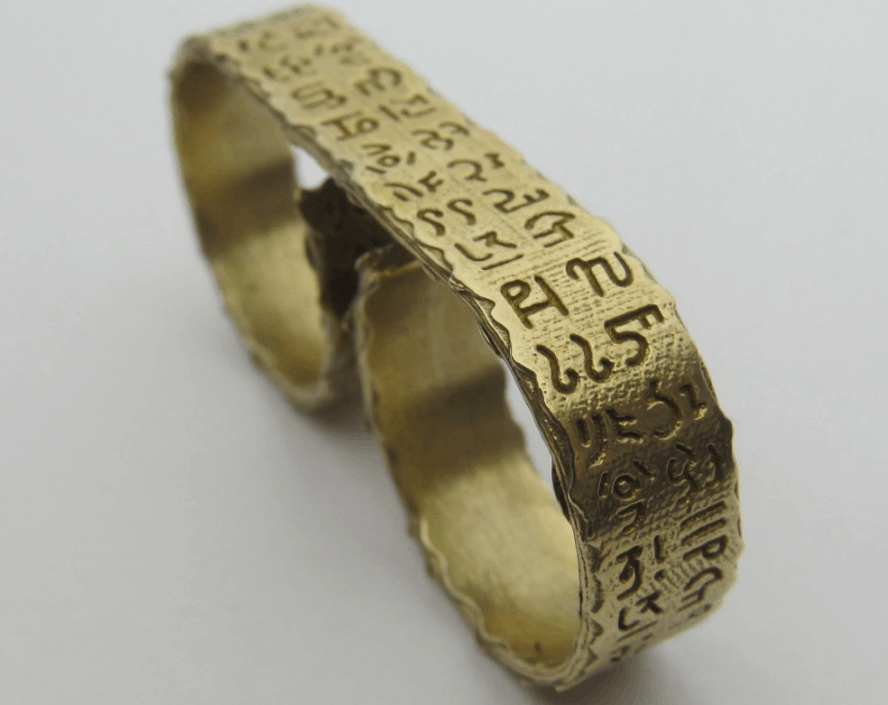Magic in 5e D&D can be a little confusing for the new players and even for the veteran players to the game. All the spells, spell effects, spell slots, and more can get hard to keep straight, and it is also hard to keep track of the number of spells you can cast and have cast per day. Plus, don’t even get started on the rabbit hole that is cantrips!
Thankfully, magical items like Rings exist that make everything much easier, and one of those is the Ring of Spell Storing. It does exactly what it says on the tin, and stores spell for later use.
But how do they store spells? What level of spells do these rings store? How does it affect your daily spell limit? All of these questions and more will be answered when we share our guide for the Ring Of Spell Storing. Welcome to a Ring of Spell Storing Guide.
What Is The Ring of Spell Storing?

It is a rare ring item, and according to the Player’s Handbook:
This ring store Spells cast into it, holding them until the attuned wearer uses them. The ring can store up to 5 levels worth of Spells at a time. When found, it contains 1d6 – 1 level of stored Spells chosen by the DM.
Any creature can cast a Spell of 1st through 5th Level into the ring by touching the ring as the spell is cast. The spell has no effect, other than to be stored in the ring. If the ring can’t hold the spell, the spell is expended without effect. The level of the slot used to cast the spell determines how much space it uses.
While wearing this ring, you can cast any spell stored in it. The spell uses the slot level, spell save DC, spell attack bonus, and Spellcasting Ability of the original caster, but is otherwise treated as if you cast the spell. The spell cast from the ring is no longer stored in it, freeing up space.
Let’s break it down. First, it can store up to five levels worth of spells at a time. It can store one level 5 spell, 5 level one spells, or any combination of level 1-5 spells that add up to five. Any creature can cast a spell into the ring, using up a spell slot, but otherwise, the spell is stored in the ring. Interestingly, the level of the slot used for the spell is the determiner of the space it takes, more on this in a bit.
Then, you just point the ring, ‘cast’ the spell, and it fires out of the ring just like whenever you cast the spell normally. It uses all the stats of the caster and then the space is freed. This is a very interesting item for a few reasons that we will get into now.
Anyone Can Cast Into and Use The Ring
For starters, there’s no alignment or class limit for the spells in your ring. That means, for example, a Paladin could cast druid level spells he doesn’t have access to if his druid buddy charges the ring with a few nature spells and vise versa. The druid could cast paladin spells. You could also force a necromancer or other evil character to cast spells into the ring as well, and then use those with no penalty.
See also: Comprehensive Necromancer 5e Guide.
Additionally, anyone with fingers or the ability to wear a ring can use it. So a nonmagical fighter, barbarian, or rogue can have a complement of spells at their disposal, possibly spells that are unique to what they can do.
You Get An Extra Spell Slot
Magical characters can cast spells several times a day, but after a while of casting with no rest, they need to recharge their spell slots. In most cases, rest opportunities abound and safe havens are pretty easy to find or create. However, if your party is in the final stretch of an enemy dungeon, fighting for their lives against waves of enemies, or just unable to take a rest because the risks are too great, then they might need a booster.
A couple of charges of cure light wounds and a bless spell can easily be packed into the ring and banked for later, so your cleric and paladin can use their spells and spell slots more offensively. Basically, you get an extra spell slot that doesn’t count against your total.
It Uses The Caster’s Abilities and Not Yours
If you give an untrained magic fighter a ring that fires off a fireball spell on command, thankfully their non-existent magical skills are not going to be called up when they attempt to unleash a fireball. Instead, your wizard, who placed the level four fireball spell in there and warned you to use it only for emergencies takes control.
Their stats, skills, and spell save DC take a point, which means that the spell from the ring is just as effective as if the Wizard had cast it himself. That certainly makes you a lot more confident when it comes to using the spells in the ring as a non-magical character, right?
How Are The Spells Cast From The Ring?
Most spells have components that their casters need to keep track of whenever they cast the spell. A piece of wood, diamond dust, physical contact with a holy symbol, and more are all required when it comes to casting spells. But what about whenever you point the ring at an enemy and say “I cast fireball?”
The components and other things that are required of the spell were used whenever the spell was cast into the ring. Whenever the wizard cast fireball he merely stored it in the ring, ready to be used the moment the wearer wills it. Then you just cast the spell with a standard action and that’s that the spell’s effect takes place.
The only thing that remains the same is the casting time. So while casting a fireball from the ring will be instant (same as the spell time), casting something like Magic Circle will take a minute to cast because that is the spell casting time.
How Do I Get A Ring Of Spell Storing?

This is classified as a rare item, so you won’t find them for sale in a dozen different places. Instead, you might find them at magic shops, or perhaps a store that sells magical items, but they will probably be inside of the bigger cities and towns. You might also find them in the hands of bandit warlords, wizards and necromancers, and maybe even intelligent monsters. After all, a few extra spells come in handy.
If you manage to find a ring off a corpse or as part of a treasure hoard, the DM can take into account this rule: When found, it contains 1d6 – 1 level of stored Spells chosen by the DM. Of course, this could be modified a bit if the enemy wearing the ring was casting spells, but you are likely to find that even the used rings have some juice still left in them.
You will need to attune to the ring to discover the spells inside of the ring, as only attuned wearers know what the spell names are. Still, it can provide a bit of insight into who it was you were fighting whenever you see what spells they put inside of their rings.
Who Will Best Benefit From The Ring Of Spell Storing?
Anyone inside of the party can use the ring of spell storing. While at first glance it seems like a good idea to give it to a non-magical member of the party along with spells that suit their abilities, you can also keep it on the finger of your magic user. They will be able to keep it topped up with spells they use all the time, and potentially gain an extra spell slot.
Of course, you could also load it up with rogue, barbarian, and ranger specific powers and give it to one of those classes to give them an edge. Another way parties use the ring is to store heal and buff spells for emergencies. So there’s a lot that can be done, and everyone can benefit from the ring.
Talk amongst your party and see what they all say, and you should be able to come to an agreement over what happens to the ring and what spells go into it. You might even come up with a few nice combos if you have several spellcasters in the party.
Counterspelling Spells From The Ring Of Spell Storing

You can counterspell the spells from the ring, just as if the magic-user were casting it themselves. The action of casting the spell triggers the counterspell, as according to the counterspell description: You attempt to interrupt a creature in the process of casting a spell.
If the creature is casting a spell of 3rd level or lower, its spell fails and has no effect. If it is casting a spell of 4th level or higher, make an ability check using your spellcasting ability. The DC equals 10 + the spell’s level. On a success, the creature’s spell fails and has no effect.
Since they are still ‘casting a spell’ the spell can be counterspell and the same effects apply.
Ring Of Spell Storing Guide: FAQs
Question: Can I Cast Defensive Spells On Myself With The Ring?
Answer: You don’t just have to place offensive spells into the ring, or even spells that affect others. You can cast spells such as blur, enlarge person, and spirit guardians into the ring, and then give those defensive buffs to your frontline fighter. This is twofold, first, you don’t need to spend a spell slot and a turn casting the spell and affecting your frontline, and second, your fighter can run up, draw his sword, and spend an action casting the spell. Then he’s got a defensive buff right in time for the enemies to attack him.
Any spell can be placed into the ring, offensive or defensive, as long as it follows two rules: It must be level 5 or below, and the total number of spell levels inside the ring must not exceed five. Otherwise, go nuts with it!
Question: Can You Store Cantrips Inside Of The Ring?
Answer: For those who are unaware, cantrips are the basic spells that require no magical effort to be cast. Instead, they take up no spell slots and can be cast indefinitely, and if you happen to have a few good cantrips you can even clear entire encounters without busting out the heavy spells. It’s fun and annoying all at the same time!
Cantrips do not take a spell slot and are essentially spell level ‘zero’ for most characters, so they would not meet the 1st to 5th level rule. Otherwise, that would be very overpowered.
Question: What Are The Best Spells For A Ring Of Spell Storing?
Answer: Now, this is going to start out with the disclaimer that every party and player is different, and will most likely have their own ideas of what the ‘best spells’ are for the ring. Don’t take the options presented below as the only suggestion.
First, spells that require concentration are really good, because in most cases you are using only one of those spells at the time. Having another person casting a concentration spell allows you to concentrate on different spells or use other abilities entirely. Placing a counterspell in there can allow your frontline to deal with enemy spellcasters effectively.
Emergency spells and heal spells are also always good whenever the dice are rolling poorly and you need to get everyone back on their feet. Finally, defensive spells like shield and haste are very good too. Remember, the purpose of the ring of spell storing is not to turn your ranger into a second spellcaster, but rather to give the rest of the party access to spells that can turn the tide of battle quicker.
Read more relevant guides:
- DnD Demons Guide: What Are Demons in 5e? - September 18, 2021
- Detect Thoughts 5e Guide: When, Why and How to Use It - September 9, 2021
- The Ultimate DnD Toll the Dead 5e Guide - September 9, 2021

